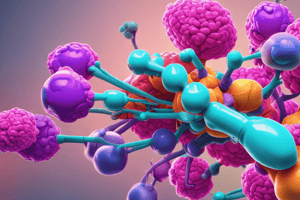Podcast
Questions and Answers
What is the main action of antiestrogens like Clomiphene (Clomid) in the body?
What is the main action of antiestrogens like Clomiphene (Clomid) in the body?
- Stimulating the release of testosterone
- Promoting the development of non-ovulatory ovarian follicles
- Blocking estrogen receptors to induce ovulation (correct)
- Inhibiting the secretion of FSH and LH
How do antiestrogens affect the feedback inhibition of estrogen?
How do antiestrogens affect the feedback inhibition of estrogen?
- Blocking the action of LH and FSH
- Enhancing the feedback inhibition
- Preventing the feedback inhibition (correct)
- Promoting the synthesis of estrogen
Which hormone is responsible for stimulating the development of ovarian follicles into ovulatory stages?
Which hormone is responsible for stimulating the development of ovarian follicles into ovulatory stages?
- Estrogen
- FSH (Follicle-Stimulating Hormone) (correct)
- Progesterone
- Testosterone
What might be a possible outcome of increased estrogen secretion stimulated by antiestrogens?
What might be a possible outcome of increased estrogen secretion stimulated by antiestrogens?
What is the therapeutic value of clomiphene (Clomid) as mentioned in the text?
What is the therapeutic value of clomiphene (Clomid) as mentioned in the text?
Which receptor predominates in the ovaries and prostate glands for estrogen binding?
Which receptor predominates in the ovaries and prostate glands for estrogen binding?
How do estrogens help in reducing the risk of atheromasias according to the text?
How do estrogens help in reducing the risk of atheromasias according to the text?
Which of the following is an anti-estrogen mentioned in the text?
Which of the following is an anti-estrogen mentioned in the text?
What is the main effect of Tamoxifen on the uterus?
What is the main effect of Tamoxifen on the uterus?
How does Tamoxifen affect bone health?
How does Tamoxifen affect bone health?
Which tissue does Tamoxifen primarily target in the body?
Which tissue does Tamoxifen primarily target in the body?
What is a common adverse effect of Tamoxifen use?
What is a common adverse effect of Tamoxifen use?
Study Notes
- Antioestrogens prevent feedback inhibition, leading to increased gonadotrophin release and ovulation induction
- Clomiphene (Clomid) is an example of an antiestrogen used to treat infertility, acting as a non-steroidal competitive antagonist of estrogen receptors
- Clomiphene and other antiestrogens have both antioestogenic and oestrogenic actions, with varying impacts on different tissues and body systems
- In breast tissue, antiestrogens inhibit oestrogen-responsive gene transcription
- Uses for antiestrogens include breast cancer treatment and increasing ovulation in infertile women
- Tamoxifen is another antiestrogen with selective ER-modulating effects on various tissues, including decreasing bone resorption and reducing breast cancer risk
- Raloxifene is an antiestrogen used to prevent and treat osteoporosis, with antiresorptive effects on bone and potential risks of venous thrombosis
- Hormones, including oestrogens, have specific receptors and can be targeted with agonists and antagonists for therapeutic purposes
- Estrogens stimulate secondary sexual characteristics and gonadal growth, but can also cause side effects such as fluid retention and reversible hypertension in some women.
Studying That Suits You
Use AI to generate personalized quizzes and flashcards to suit your learning preferences.
Description
Learn about how antiestrogens prevent feedback action inhibition and induce ovulation by allowing the release of gonadotrophins and development of ovarian follicles. Discover the mechanism behind antiestrogens acting as ovulation inducing agents.


